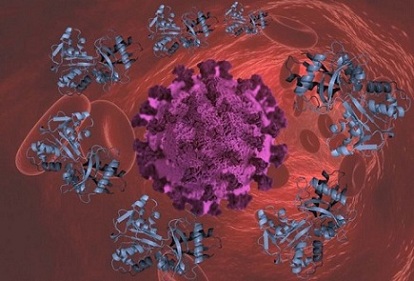Brazilian Study Confirms That SARS-CoV-2 Proteins Binds Not Only To Metabolites Of Hemoglobin Like Biliverdin But Also To Hemoglobin Itself!
Source: Controversial COVID-19 Research Aug 31, 2021 3 years, 7 months, 3 weeks, 3 days, 19 hours, 9 minutes ago
A new research by Brazilian researchers from the National Institute of Science and Technology for Innovation-Brazil, Oswaldo Cruz Institute, Iguaçu University and the Federal Fluminense University has found that the SARS-CoV-2 proteins binds not only to metabolites of hemoglobin like biliverdin but also to hemoglobin itself!

The study findings were published in the peer reviewed International Journal of Molecular Sciences.
https://www.mdpi.com/1422-0067/22/16/9035
There have already been studies confirming that the SARS-CoV-2 spike proteins are able bind to the hemoglobin metabolites like biliverdin and bilirubin, disrupting the ability of neutralizing antibodies to bind to the invading pathogen itself in the human host.
https://www.thailandmedical.news/news/breaking-news-study-shows-human-haem-metabolites-biliverdin-and-bilirubin-blocks-the-binding-of-neutralizing-antibodies-to-sars-cov-2
However a study published last year by Chinese researchers as to the possibility of SARS-CoV-2 virus “attacking the 1-beta chain of hemoglobin and capturing the porphyrin to Inhibit human heme metabolism” drew widespread criticisms from ignorant and stupid so called ‘fact checkers’ and also certain garbage ‘researchers’.
https://www.thailandmedical.news/news/must-read-research-reveals-that-covid-19-attacks-hemoglobin-in-red-blood-cells,-rendering-it-incapable-of-transporting-oxygen--current-medical-protoco
https://chemrxiv.org/engage/chemrxiv/article-details/60c74fa50f50db305139743d
Despite many research institutions later endorsing the findings, not much was ever heard again on the subject.
The new study by the Brazilian researchers once again brings up evidence that the SARS-CoV-2 proteins are able to bind to hemoglobin itself and this has numerous clinical implications.
The COVID-19), caused by the SARS-CoV-2 coronavirus, has been linked to hematological dysfunctions, but there are little experimental data that explain this. Spike (S) and Nucleoprotein (N) proteins have been putatively associated with these dysfunctions.
In this new research, the study team analyzed the recruitment of
hemoglobin (Hb) and other metabolites (hemin and protoporphyrin IX-PpIX) by SARS-Cov2 proteins using different approaches.
The study team utilized shotgun proteomics (LC-MS/MS) after affinity column adsorption identified hemin-binding SARS-CoV-2 proteins. The parallel synthesis of the peptides technique was used to study the interaction of the receptor bind domain
(RBD) and N-terminal domain (NTD) of the S protein with Hb and in silico analysis to identify the binding motifs of the N protein. The plaque assay was used to investigate the inhibitory effect of Hb and the metabolites hemin and PpIX on virus adsorption and replication in Vero cells.
Importantly the study findings showed that the proteomic analysis by LC-MS/MS identified the S, N, M, Nsp3, and Nsp7 as putative hemin-binding proteins. Six short sequences in the RBD and 11 in the NTD of the spike were identified by microarray of peptides to interact with Hb and tree motifs in the N protein by in silico analysis to bind with heme.
Also an inhibitory effect in vitro of Hb, hemin, and PpIX at different levels was observed. Strikingly, free Hb at 1mM suppressed viral replication (99%), and its interaction with SARS-CoV-2 was localized into the RBD region of the spike protein.
The study team concluded, “We identified that at least five proteins (S, N, M, Nsp3, and Nsp7) of SARS-CoV-2 recruit Hb/metabolites. The motifs of the RDB of SARS-CoV-2 spike, which binds Hb, and the sites of the heme bind-N protein were also identified. Significantly these compounds and PpIX block the virus's adsorption and replication. Furthermore, we also identified heme-binding motifs and interaction with hemin in N protein and other structural (S and M) and non-structural (Nsp3 and Nsp7) proteins.”
A study published by researchers from the University of Pittsburgh in late 2020 said and also disputed all early study findings and claimed that there was no evidence of hemoglobin damage by SARS-CoV-2 infection.
https://www.ncbi.nlm.nih.gov/pmc/articles/PMC7716349/
None of these researchers could be contacted about the findings of this new study.
For the latest
COVID-19 Research, keep on logging to Thailand Medical News.
